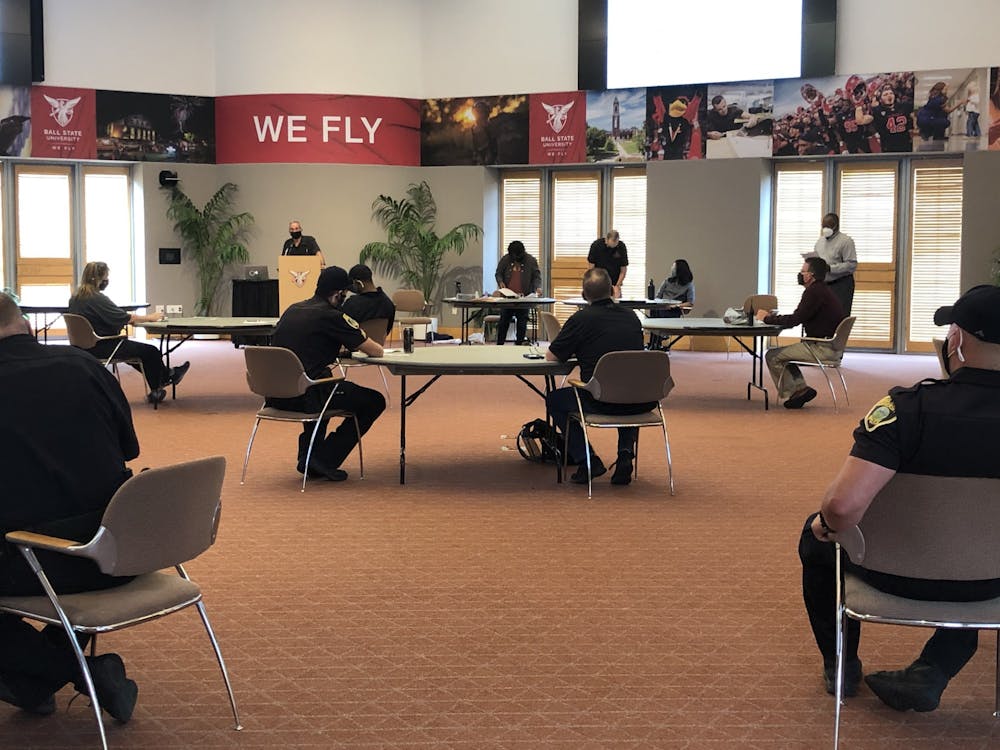Though de-escalation training is not a requirement for Indiana police officers, Ball State’s University Police Department (UPD) incorporates tactics into annual trainings.
In September 2020, UPD officers learned de-escalation techniques from the Center for Peace and Conflict Studies.
Jim Duckham, director of public safety, said this training has been a requirement for UPD officers at least since he joined the force in 2014.
“Now, there’s clearly a national push for more training in that area and for officers to respond differently,” he said. “This is the second time we’ve partnered with the Center for Peace and Conflict Studies.”
Larry Gerstein, director of the Center for Peace and Conflict Studies and professor of psychology, led the instruction for the 2015 and 2020 trainings. He said the 2015 training was called “conflict prevention and resolution,” while the 2020 training was called “de-escalation.”
Both trainings included lectures and role-playing exercises, but Gerstein said there were some differences. Parking enforcement officers did not receive training in 2015, and students were not recruited for role-playing in 2020 to have fewer people indoors in accordance with COVID-19 guidelines.
“The first time, students played out different scenarios. Then, the officers responded,” Gerstein said. “It really promoted more mutual understanding between the students and the police officers.”
Though officers didn’t receive feedback from students during last month’s training, Gerstein said he thought the officers were receptive to the role-playing scripts they read with each other.
“The biggest takeaway was to try to understand the perspective of the people you’re dealing with. You don’t have to agree with them, but try to understand them,” he said.
Gerstein said the Muncie Police Department asked to receive de-escalation training in early September, and his training team modified the curriculum to suit UPD for Sept. 17 and 24.
“Some people will ask me, ‘What is the Center for Peace and Conflict Studies doing working with the police?’” Gerstein said. “My perspective is that we need to collaborate with all kinds of groups to better understand them so they can better understand us and we can learn from each other.”
Gerstein said he thinks UPD builds relationships effectively with Ball State community members through its community policing model, which “works because there are less unknowns and there is less fear associated with interaction — there’s more trust.”
Duckham said UPD tries to conduct de-escalation training once every few years but incorporates techniques into various annual trainings including conflict resolution and crisis intervention. He estimated UPD officers complete about 80 hours of annual training, more than the 24 annual police academy training hours required by the state of Indiana.
“Ball State police have been proactive in this area,” he said. “We’ve been doing it because we think it’s important.”
Duckham said he thought it was important that parking enforcement officers also receive de-escalation training along with UPD.
“We’re a community-oriented police agency,” he said. “With parking services, it’s the same concept. They’re dealing with the community every day.”
Parking enforcement officers benefit from de-escalation knowledge while on foot patrol and writing parking tickets, Duckham said.
“You can see how someone would be upset about getting a parking ticket,” he said. “Giving our parking enforcement officers a skill set to be able to diffuse or de-escalate that — it’s really helpful.”
In addition to partnering with the Center for Peace and Conflict Studies for de-escalation training, Duckham said UPD works with the Counseling Center for mental health training and the Department of Psychological Science for implicit bias training.
“We’re really fortunate that Ball State has subject matter experts on our campus,” he said.
Melinda Messineo, department chair of psychological science and professor of sociology, instructed a UPD implicit bias training in the fall 2019 semester with the goal of identifying and fighting against microaggressions.
“What dispatchers say becomes an important part of what [officers] think they’re walking into,” she said. “If everybody is sensitive to their potential for bias, it reduces the likelihood of people misinterpreting the situation.”
Messineo said officers were receptive to the examples of microaggressions during the 2019 training and gave positive feedback about the curriculum.
“You can get better at this. This is a process,” she said. “You can’t end implicit bias in a two-hour training, but you can’t end implicit bias without starting.”
Messineo said implicit bias training helps officers better connect with the community and advance their community policing model.
“When people trust the officers and feel like the officers want to know them as individuals and not as categories, it makes them more willing to come to them if they have a need and more willing to respect their authority,” she said.
Duckham said the goal of training is to understand Ball State’s community needs. He said the goal of de-escalation training is to calm situations without using physical force.
“Any time you can de-escalate and not have to use any force, that’s a great day,” he said. “It’s really helpful to learn active listening and paraphrase back. It’s a good skill set in your entire life with people and relationships.”
Contact Grace McCormick with comments at grmccormick@bsu.edu or on Twitter @graceMc564.





